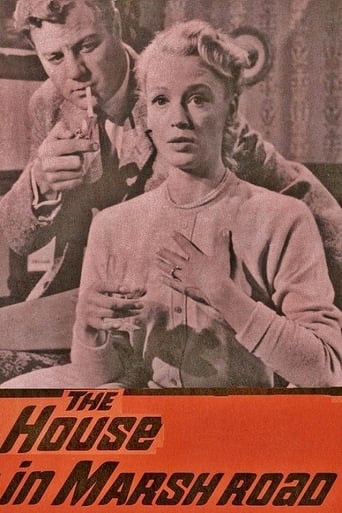Paul Evans
I enjoyed this unusual B movie, it's basically 75% domestic murder story, 25% supernatural thriller. Jean inherits a house, moves her drunken no good partner David in, and he meets someone else, a voluptuous blonde, Valerie Stockley. Valerie persuades David to kill his wife, but Jean is protected by a poltergheist, wonderfully named Patrick by the potty Irish maid Mrs O'Brien.It's unusual to say the least, I can't think of many supernatural murder mysteries, but it works. Patricia Bainton appeared in some cracking films in the 50's and 60's, my favourite being The Third Alibi, and once again she's pretty good. Sandra Dorne is pretty fabulous it has to be said.I'm struggling to believe it was made in 1960, it looks like it was should in the forties, production values are pretty poor, although the fire is pretty well done.
Spikeopath
The House in Marsh Road is directed by Montgomery Tully and adapted to screenplay by Maurice J. Wilson from the novel written by Laurence Meynell. It stars Tony Wright, Patricia Dainton, Sandra Dorne, Derek Aylward, Sam Kydd, Llewellyn Rees and Anita Sharp-Bolster. Music is by John Veale and cinematography by James Harvey.When Jean Linton (Dainton) inherits a house in the country she hopes her hard drinking novelist husband David (Wright) will settle down and make something of himself and their marriage. However, when sultry Valerie Stockley (Dorne) arrives on the scene it's not long before David's head is turned and he begins to plot the murder of his wife. Jean is in trouble, but she has an ally, the resident poltergeist of Four Winds House...Simplicity of plot and economical of running time and technical attributes, The House in Marsh Road should not be sought out by any "horror" fan craving poltergeist terror. This is a quaint and fun chiller for the most part, even with an air of jauntiness for the first half, in fact very much like The Uninvited (1944) in how the presence of a ghost is not seen as something to be outright feared. Then the mood for the latter stages of the play notably shifts into darker territory, here the dastardly David starts to put his plans in motion, something which signals time for the poltergeist to take a hand in proceedings. Which leads to a very good and genuinely edgy denouement at pics finale. It never lacks for atmosphere or period flavours, or indeed for competency of performances and direction, where although it never breaks out into the upper echelons of other classic British chillers, it's still something of a "B" chiller worthy of inspection by those who don't need to be jolted out their seats. As for "Patrick the Poltergeist", he's rightly kept off screen, or is he? One scene appears to show him? Either that or a prop guy is guilty of standing in the shot? See if you can spot the moment and judge for yourself. It's just another fun part of a movie that provides gentle chills and honest entertainment. 7/10
kevin olzak
1960's "Invisible Creature" was one of the numerous foreign titles (British, Japanese, Mexican, West German) issued straight to television in the US by American International Pictures, who even hired home grown talent to supply them with product (Larry Buchanan in particular-"Zontar the Thing from Venus"). The American copyright is 1964, and the film debuted on Pittsburgh's Chiller Theater on May 8 1965 (paired with 1959's "A Bucket of Blood"), shown again July 23 1966 (paired with 1958's "It! The Terror from Beyond Space"), and finally on August 2 1969 (paired with 1958's "Terror in the Haunted House"). Constantly shown throughout that decade, few of these have survived the test of time to be revived anymore. Today, "Invisible Creature" is deservedly obscure, as it is very low key, with a tiny no name cast (Sam Kydd a welcome presence) and nonexistent budget. Also, the new American title rather gives the game away, the original British version called "The House in Marsh Road." Patricia Dainton stars as Jean Linton, the wife of a once successful author (Tony Wright) now drinking more than he writes, who inherits a two story country cottage inhabited by a ghost. Once the husband's wandering eye settles on an attractive widow (Sandra Dorne) who prefers the company of wealth, he begins to plot a way to bump off his unknowing spouse so he can rid himself of her ancestral home. What the pair don't know is that the never seen spectre appreciates Jean far more than they do, watching over her while she remains under its roof. The exotic Sandra Dorne would meet a similar fate in 1963's "Devil Doll." I've always held a certain fondness for this one even though it's fairly predictable, but those who never viewed it back then may find it unrewarding.
Pem-3
This nicely scary little ghost story is pretty straight-forward = in plot. A husband with a sexy mistress is trying to murder his wife, and a protect= ive (family-owned) poltergeist blocks him at every attempt. But the brief summary fails to convey some fine performances and lovely atmospherics t= hat rise above what is basically a "B" - level thriller. The women take act= ing honors -- Sandra Dorne is probably at her most-enticing ripeness as the buxom blonde divorcée who lures David Linton to his doom, and she pani= cs beautifully when trapped with her lover in the doomed house; Patricia Dainton is convincing, too, as the long-suffering wife of the promiscuou= s David. Third, for comic relief, Anita Sharp-Bolster is hilarious as the Irish housekeeper, who complains about "Patrick," whom she's named after her husband "because she never sees him" either! The black and white photography is moody and penetrating, as is the haunting music of John Veale (though it gets too loud and overrides the dialogue once or twice.= ) A hard-to-find video is available from several U.S. sources, both as "Invisible Creature" and "The House in Marsh Road."


